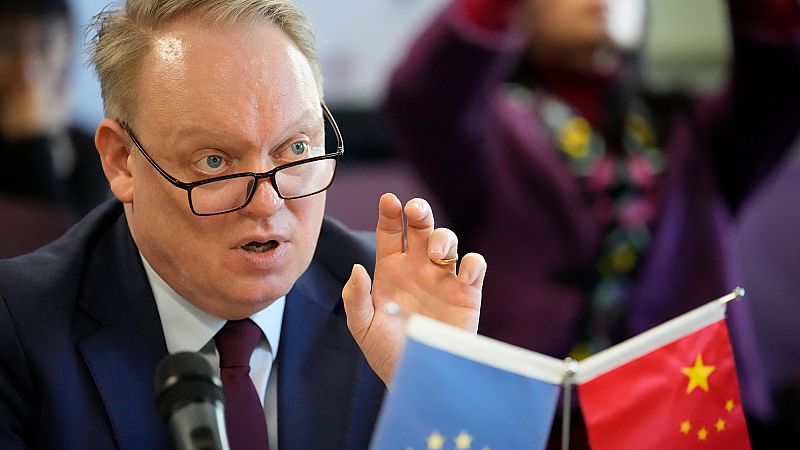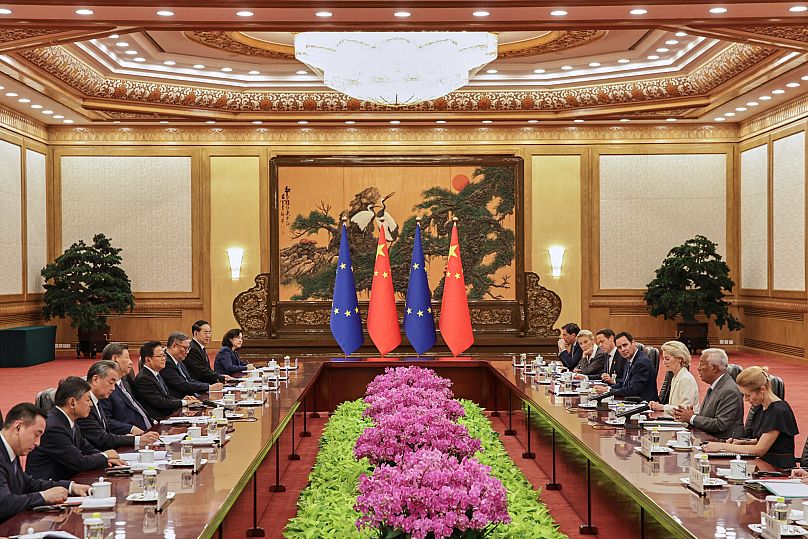EU business leader cautions on rapid growth of Chinese exports to Europe

Jens Eskelund, president of the EU Chamber of Commerce in China, warned of a sharp rise in Chinese exports to Europe following Washington’s announcement of sweeping import tariffs in April.
"We have seen in the first half of the year how exports from China to North America have been declining. So I think you could perhaps term it a trade diversion, but I don't think it's the whole story," he told Euronews in an interview on Tuesday.
Eskelund pointed to three main drivers behind the export surge — the competitiveness of Chinese firms, a weaker currency, and strong state support. Pressure that European businesses on the ground are also feeling.
According to the latest survey by the EU Chamber of Commerce in China, 73% of respondents said doing business there is becoming harder year after year, with confidence now at rock bottom. More than half (52%) also reported that the business environment had become increasingly politicised compared with the previous year.
"The pessimism that you see right now is primarily due to the state of the Chinese economy. We have seen that in many sectors there is very intense competition and overcapacity in some others," Eskelund said.
But he added that the mood could improve if Beijing manages to restore balance between supply and demand. "We really think the Chinese government right now needs to focus on how do we get back to a situation where demand and supply are in better alignment than is the case today," he argued.
Shifting trade flows from the US to Europe could have serious consequences for European industries — particularly if imports are offered at very low prices, putting local producers under strain. Still, the European Commission does not see evidence of a major trade diversion taking place.
"Our assessment at present moment is that there is no such increase that is a cause for alarm," EU Commission's spokesperson Olof Gill told reporters on Monday.
EU-China trade war: unavoidable?
In recent years, relations between the EU and China have been stuck in a cycle of friction, driven by restricted market access for European firms in China, growing trade imbalances, and Beijing’s support for Russia in its war against Ukraine.
The tension was clear when European Commission President Ursula von der Leyen travelled to Beijing for the EU-China summit in July, warning that relations had reached an “inflection point”.
Von der Leyen demanded immediate action to rebalance trade after the EU’s trade deficit with China hit €305.8 billion in 2024. She also strongly criticised China’s decision to restrict exports of seven critical raw materials — a move that, for many in Brussels, underscored Europe’s dependency on the Asian giant.
“Maybe governments should be thinking like companies,” Jens Eskelund, president of the EU Chamber of Commerce in China, told Euronews. He argued that governments, like businesses, need to consider alternatives when a key supply source dries up.
“One of the things that we have learned in recent years is that we always need to have a plan B and perhaps even a plan C,” he added.
But with the United States stepping up pressure on Europe to harden its stance, and trade imbalances showing no sign of easing, Eskelund cautioned that tensions with China are almost certain to rise if nothing changes.
“We don't think that anything is unavoidable, but we think that we are on a trajectory where we need to stop and ask ourselves: are we right now increasing the risk?” he said.
To prevent relations from deteriorating further, the EU business leader urged both sides to sit down and listen to each other’s concerns before the fallout becomes too costly for both economies.
“It's very difficult for us to predict what the future looks like, (but) all this volatility right now is something that affects business behaviours, and I think that right now is a big challenge,” he said.
Jorge Liboreiro contributed to this story.
Today


